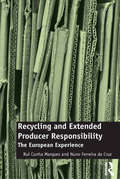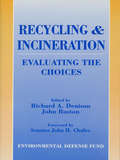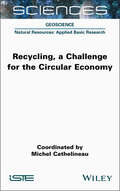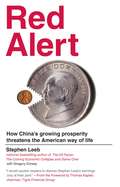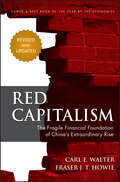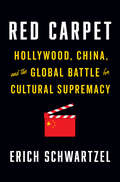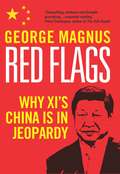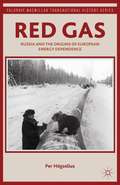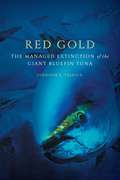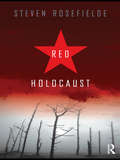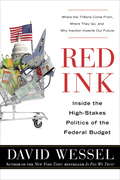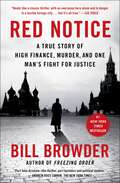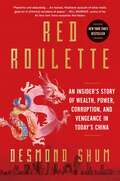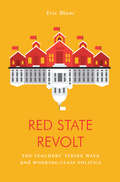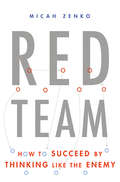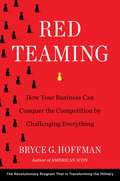- Table View
- List View
Recycling and Extended Producer Responsibility: The European Experience
by Rui Cunha Marques Nuno Ferreira CruzAn overriding value of European legislation on waste management is the Extended Producer Responsibility (EPR) principle. For example, all economic operators placing packaging onto the EU market are responsible for its proper management and recovery. However, in general, the collection and treatment of urban waste is the responsibility of local authorities. It has therefore been necessary to establish a system of financial compensations between producers and waste management operators. Analysing the legal and institutional schemes of several member states and accounting for all the costs and benefits to their local authorities due to selective collection and sorting, this book provides an accurate illustration of how the EPR principle has be translated into practice. Firstly the authors examine whether the industry is paying for the net financial cost of 'preparation for recycling' activities or if the extra-costs of recycling are being recovered via the sale of sorted materials, by the consumer through higher prices or by citizens in general through higher taxes. Secondly, by monetizing the net environmental benefits attained with the recycling system, the book discusses the success and Value-for-Money (VfM) of the EU’s recycling policy. In other words: what is the economic rate of return of the enhanced environmental protection achieved due to the fulfilment of recovery and recycling targets?
Recycling and Incineration: Evaluating The Choices
by John Ruston Richard Denison Environmental Defense FundRecycling and Incineration presents information on the technology, economics, environmental concerns, and legal intricacies behind recycling and incineration programs.
Recycling, a Challenge for the Circular Economy (ISTE Consignment)
by Michel CathelineauReducing consumption is now an absolute necessity for the future of our environment. The circular economy is designed to reduce resource wastage and waste production, but also enables waste recovery, leading to the creation of secondary resources. All materials, regardless of how they have been processed, can be reused. Recycling, a Challenge for the Circular Economy begins its analysis by raising awareness of the role of each of us in reducing the volume of individual waste. The book then outlines the strategies and challenges involved in recycling a wide range of materials, from minimally processed (wood, glass, building materials or polluted soil) to highly processed (electrical and electronic waste, batteries, magnets or plastics). Aspects of resource availability are also discussed, as well as ways of addressing the dynamic cycle of materials in the context of ever-increasing demand.
Red Alert: How China's Growing Prosperity Threatens the American Way of Life
by Stephen Leeb Gregory Dorsey"I would caution readers to dismiss Stephen Leeb's warnings only at their peril." -Thomas Kaplan, chairman, Tigris Financial Group The American Dream is close to being replaced by a living nightmare: Key commodities that are essential to our daily lives and that are widely believed to be abundant are running critically short. Even worse, the Chinese are doing what they can to monopolize the world's dwindling resources.The U.S. is now largely dependent on our greatest economic rival for rare earth elements as well as a host of other minerals-all of which are absolutely essential to the development of alternative energies and are critically important for our defense industry, computers, cell phones, and other electronic devices. While America has been fighting wars in Iraq and Afghanistan, China has focused its substantial muscle on securing vital commodities from these and other lands to upgrade its infrastructure and industrial strength to meet the resource challenge head-on.China has wrapped itself in the green flag of combating climate change while systematically discouraging other nations from adopting similar policies in a bid to gain time to achieve its plans. RED ALERT is a provocative and frightening look at the growing political, economic, and social power of China and the threat that nation poses to the Western world. It lays out how the Chinese are strategizing to overtake the United States as the world's premier economic power-and details how our failure to respond quickly will result in a permanently lower standard of living for Americans. Peppered with startling statistics, charts, and evidence of how China continues to expand its economic reach, RED ALERT is both controversial and powerful in its scope.
Red Bull
by Carin-Isabel Knoop Eric J. Van Den SteenDespite facing giants like Coke, Pepsi, and Budweiser-with obvious potential sources of competitive advantage-Red Bull had established itself as the U.S. market leader in energy drinks. By 2008, however, Red Bull's dominance was challenged as Monster drinks surpassed it in volume. The case considers judo strategy both from the perspective of a small player (when up-start Red Bull faces Coke, Pepsi, and Bud) and as a large player (when market leader Red Bull faces up-start Monster).
Red Bull (A)
by Carin-Isabel Knoop Eric Van Den SteenDespite facing giants like Coke, Pepsi, and Budweiser-with obvious potential sources of competitive advantage-Red Bull had established itself as the U.S. market leader in energy drinks. By 2008, however, Red Bull's dominance was challenged as Monster drinks surpassed it in volume. The case considers judo strategy both from the perspective of a small player (when up-start Red Bull faces Coke, Pepsi, and Bud) and as a large player (when market leader Red Bull faces up-start Monster).
Red Capitalism: The Fragile Financial Foundation of China's Extraordinary Rise
by Carl Walter Fraser HowieThe truth behind the rise of China and whether or not it will be able to maintain it How did China transform itself so quickly? In Red Capitalism: The Fragile Financial Foundation of China's Extraordinary Rise, Revised Edition Carl Walter and Fraser Howie go deep inside the Chinese financial machine to illuminate the social and political consequences of the unique business model that propelled China to economic powerhouse status, and question whether this rapid ascension really lives up to its reputation. All eyes are on China, but will it really surpass the U.S. as the world's premier global economy? Walter and Howie aren't so certain, and in this revised and updated edition of Red Capitalism they examine whether or not the 21st century really will belong to China. The specter of a powerful China is haunting the U.S. and other countries suffering from economic decline and this book explores China's next move Packed with new statistics and stories based on recent developments, this new edition updates the outlook on China's future with the most cutting-edge information available Find out how China financed its current position of strength and whether it will be able to maintain its astonishing momentum Indispensable reading for anyone looking to understand the limits that China's past development decisions have imposed on its brilliant future, Red Capitalism is an essential resource for anyone considering China's business strategies in today's extremely challenging global economy.
Red Carpet: Hollywood, China, and the Global Battle for Cultural Supremacy
by Erich Schwartzel"This is a fascinating book. It will educate you. Schwartzel has done some extraordinary reporting." — The New York Times Book Review &“In this highly entertaining but deeply disturbing book, Erich Schwartzel demonstrates the extent of our cultural thrall to China. His depiction of the craven characters, American and Chinese, who have enabled this situation represents a significant feat of investigative journalism. His narrative is about not merely the movie business, but the new world order.&” —Andrew Solomon, author of Far from the Tree and The Noonday DemonAn eye-opening and deeply reported narrative that details the surprising role of the movie business in the high-stakes contest between the U.S. and ChinaFrom trade to technology to military might, competition between the United States and China dominates the foreign policy landscape. But this battle for global influence is also playing out in a strange and unexpected arena: the movies. The film industry, Wall Street Journal reporter Erich Schwartzel explains, is the latest battleground in the tense and complex rivalry between these two world powers. In recent decades, as China has grown into a giant of the international economy, it has become a crucial source of revenue for the American film industry. Hollywood studios are now bending over backward to make movies that will appeal to China&’s citizens—and gain approval from severe Communist Party censors. At the same time, and with America&’s unwitting help, China has built its own film industry into an essential arm of its plan to export its national agenda to the rest of the world. The competition between these two movie businesses is a Cold War for this century, a clash that determines whether democratic or authoritarian values will be broadcast most powerfully around the world. Red Carpet is packed with memorable characters who have—knowingly or otherwise—played key roles in this tangled industry web: not only A-list stars like Matt Damon, Angelina Jolie, and Richard Gere but also eccentric Chinese billionaires, zany expatriate filmmakers, and starlets who disappear from public life without explanation or trace. Schwartzel combines original reporting, political history, and show-biz intrigue in an exhilarating tour of global entertainment, from propaganda film sets in Beijing to the boardrooms of Hollywood studios to the living rooms in Kenya where families decide whether to watch an American or Chinese movie. Alarming, occasionally absurd, and wildly entertaining, Red Carpet will not only alter the way we watch movies but also offer essential new perspective on the power struggle of this century.
Red Flags: Why Xi's China Is in Jeopardy
by George MagnusA trusted economic commentator provides a penetrating account of the threats to China's continued economic rise Under President Xi Jinping, China has become a large and confident power both at home and abroad, but the country also faces serious challenges. In this critical take on China’s future, economist George Magnus explores four key traps that China must confront and overcome in order to thrive: debt, middle income, the Renminbi, and an aging population. Looking at the political direction President Xi Jinping is taking, Magnus argues that Xi’s authoritarian and repressive philosophy is ultimately not compatible with the country’s economic aspirations. Thorough and well researched, the book also investigates the potential for conflicts over trade, China’s evolving relationship with Trump, and the country’s attempt to win influence and control in Eurasia through the Belt and Road initiative.
Red Gas: Russia and the Origins of European Energy Dependence (Palgrave Macmillan Transnational History Series)
by Per HögseliusThis book applies a systems and risk perspective on international energy relations, author Per Högselius investigates how and why governments, businesses, engineers and other actors sought to promote – and oppose– the establishment of an extensive East-West natural gas regime that seemed to overthrow the fundamental logic of the Cold War.
Red Globalization
by Oscar Sanchez-SibonyWas the Soviet Union a superpower? Red Globalization is a significant rereading of the Cold War as an economic struggle shaped by the global economy. Oscar Sanchez-Sibony challenges the idea that the Soviet Union represented a parallel socio-economic construct to the liberal world economy. Instead he shows that the USSR, a middle-income country more often than not at the mercy of global economic forces, tracked the same path as other countries in the world, moving from 1930s autarky to the globalizing processes of the postwar period. In examining the constraints and opportunities afforded the Soviets in their engagement of the capitalist world, he questions the very foundations of the Cold War narrative as a contest between superpowers in a bipolar world. Far from an economic force in the world, the Soviets managed only to become dependent providers of energy to the rich world, and second-best partners to the global South.
Red Gold: The Managed Extinction of the Giant Bluefin Tuna
by Jennifer E. TelescaIlluminating the conditions for global governance to have precipitated the devastating decline of one of the ocean&’s most majestic creatures The International Commission for the Conservation of Atlantic Tunas (ICCAT) is the world&’s foremost organization for managing and conserving tunas, seabirds, turtles, and sharks traversing international waters. Founded by treaty in 1969, ICCAT stewards what has become under its tenure one of the planet&’s most prominent endangered fish: the Atlantic bluefin tuna. Called &“red gold&” by industry insiders for the exorbitant price her ruby-colored flesh commands in the sushi economy, the giant bluefin tuna has crashed in size and number under ICCAT&’s custodianship.With regulations to conserve these sea creatures in place for half a century, why have so many big bluefin tuna vanished from the Atlantic? In Red Gold, Jennifer E. Telesca offers unparalleled access to ICCAT to show that the institution has faithfully executed the task assigned it by international law: to fish as hard as possible to grow national economies. ICCAT manages the bluefin not to protect them but to secure export markets for commodity empires—and, as a result, has become complicit in their extermination.The decades of regulating fish as commodities have had disastrous consequences. Amid the mass extinction of all kinds of life today, Red Gold reacquaints the reader with the splendors of the giant bluefin tuna through vignettes that defy technoscientific and market rationales. Ultimately, this book shows, changing the way people value marine life must come not only from reforming ICCAT but from transforming the dominant culture that consents to this slaughter.
Red Hat and the Linux Revolution
by Alan Maccormack Kerry HermanThe case describes the history of the Linux operating system and the open-source movement in general. Focuses on a critical decision being made by Red Hat, the largest distributor of Linux, about its future development efforts. The decision allows students to explore alternative approaches to software development and examine the dramatic success of the open-source method.
Red Hen Baking Company
by Richard S. Ruback Royce YudkoffIn 2007, the Red Hen Baking Company was deciding whether to move from its cramped and inefficient facility to a new facility. It had been in business about 8 years, and 2006 was the first year RHB realized a profit that was over $50,000. The added annual cost of the new location was about $58,000 and would require a $300,000 build-out. While the owner of Red Hen was excited about the possibility of a new, efficient bakery, he wondered if it was worth the added expense and risk.
Red Herrings and Long Hauls: What Is, and Isn't, Difficult About Adopting Emergent Web Tools into Your Organization's DNA
by Andrew McafeeWhen considering an Enterprise 2.0 effort, many business decision makers have some typical concerns: How do we get employees to use the new capabilities? Will people just use social networking software to plan happy hour, rather than to get work done? If the information on these platforms really is valuable, won't it be harvested by spies and sold to the highest bidder? In the end, many companies conclude that whatever the benefits of Enterprise 2.0, it's not worth running the array of risks indicated by these and other questions. According to author Andrew McAfee, they are making a big mistake-these concerns, he maintains, are mostly red herrings. This chapter looks realistically at the principal challenges of Enterprise 2.0, the main obstacles to an organization's successful deployment of emergent social software platforms (ESSPs). McAfee begins by boldly laying out many of the feared negative implications, and then addresses point by point how the very attributes of ESSPs actually militate against their abuse. He also deflates unrealistic expectations, addressing the actual problems organizations are likely to encounter as they move to an Enterprise 2.0 model, and offers solid advice on how these, too, can be overcome. This chapter was originally published as Chapter 6 of "Enterprise 2.0: New Collaborative Tools for Your Organization's Toughest Challenges."
Red Holocaust
by Steven RosefieldeTwentieth and twenty-first century communism is a failed experiment in social engineering that needlessly killed approximately 60 million people and perhaps tens of millions more. These high crimes against humanity constitute a Red Holocaust that exceeds the combined carnage of the French Reign of Terror, Ha Shoah, Showa Japan's Asian holocaust, and all combat deaths in World War I and II. This fascinating book investigates high crimes against humanity in the Soviet Union, eastern and central Europe, North Korea, China, Vietnam, Laos and Cambodia 1929-2009, and compares the results with Ha Shoah and the Japanese Asian Holocaust. As in other studies, blame is ascribed to political, ideological and personal causes, but special emphasis is given to internal contradictions in Marx's utopian model as well as Stalinist and post-Stalinist transition systems concocted to realize communist ends. This faulty economic engineering forms a bridge to the larger issue of communism's historical failure. The book includes: - a comprehensive study of the transcommunist holocaust - a judicial assessment of holocaust culpability and special pleadings - an obituary for Stalinism everywhere except North Korea, and a death watch for contemporary communism in China, Vietnam, Laos, Cambodia, North Korea, Cuba and Nepal - a comparative assessment of totalitarian high crimes against humanity - a call for memory as a defense against recurrent economic, racial and ethnic holocausts The book will be useful to undergraduate and higher level students interested in Russian history, Stalism, communism, North and South Korean economic performance and international affairs. Steven Rosefielde is a Professor of Economics at the University of North Carolina, Chapel Hill and a member of the Russian Academy of Natural Sciences.
Red Ink: Inside the High-stakes Politics of the Federal Budget
by David WesselDavid Wessel, the Pulitzer-Prize-winning reporter, columnist, and bestselling author of In Fed We Trust, dissects a topic--the federal budget--that is fiercely debated today in the halls of Congress and the media, and yet is misunderstood by the American public. In a sweeping narrative about the people and the politics behind the budget, Wessel looks at the 2011 fiscal year (which ended September 30) to see where all the money was actually spent, and why the budget process has grown wildly out of control. Through the eyes of key people--Jacob Lew, White House director of the Office of Management and Budget; Douglas Elmendorf, director of the Congressional Budget Office; Blackstone founder and former Commerce Secretary Pete Peterson; and more--Wessel gives readers an inside look at the making of our unsustainable budget.
Red Lobster
by David E. Bell Jason RiisRed Lobster, a 40-year-old chain of seafood restaurants, has just completed some market research revealing an opportunity to shift their target customer segment. The chain is in the final stages of a 10-year plan of rejuvenation under CEO Kim Lopdrup. When he took over as CEO in 2004 the chain was closing restaurants and suffering declining same store sales and declining customer satisfaction. But in 2010, even in a recession, the fortunes of the chain are improving. A recently commissioned market research study has revealed, unexpectedly, that 25% of Red Lobster's customers are "experientials," people coming for a "good evening out" rather than Red Lobster's traditional core customer who came because of a craving for seafood. Should this news cause Lopdrup to do anything differently?
Red Notice: A True Story of High Finance, Murder, and One Man's Fight for Justice
by Bill Browder<P>A real-life political thriller about an American financier in the Wild East of Russia, the murder of his principled young tax attorney, and his dangerous mission to expose the Kremlin's corruption. <P>Bill Browder's journey started on the South Side of Chicago and moved through Stanford Business School to the dog-eat-dog world of hedge fund investing in the 1990s. It continued in Moscow, where Browder made his fortune heading the largest investment fund in Russia after the Soviet Union's collapse. But when he exposed the corrupt oligarchs who were robbing the companies in which he was investing, Vladimir Putin turned on him and, in 2005, had him expelled from Russia. <P> In 2007, a group of law enforcement officers raided Browder's offices in Moscow and stole $230 million of taxes that his fund's companies had paid to the Russian government. Browder's attorney Sergei Magnitsky investigated the incident and uncovered a sprawling criminal enterprise. A month after Sergei testified against the officials involved, he was arrested and thrown into pre-trial detention, where he was tortured for a year. On November 16, 2009, he was led to an isolation chamber, handcuffed to a bedrail, and beaten to death by eight guards in full riot gear. <P>Browder glimpsed the heart of darkness, and it transformed his life: he embarked on an unrelenting quest for justice in Sergei's name, exposing the towering cover-up that leads right up to Putin. <P>A financial caper, a crime thriller, and a political crusade, Red Notice is the story of one man taking on overpowering odds to change the world. <P><b>A New York Times Bestseller</b>
Red Roulette: An Insider's Story of Wealth, Power, Corruption, and Vengeance in Today's China
by Desmond ShumA unique and incendiary memoir from an entrepreneur who rose to the highest realms of power and money in China and whose wife was disappeared, Red Roulette reveals the truth of what is happening inside the country&’s wealth-making machine. After the Communist Revolution, Desmond Shum&’s grandfather was marked as belonging to a &“black category&” that included former landlords and rich peasants—meaning the Shums would be stigmatized and impoverished. As Desmond was growing up, he vowed his life would be different. Through hard work and sheer tenacity Shum earned an American college degree and returned to China to establish himself in business. There, he met his future wife, the highly intelligent and equally ambitious Whitney Duan who was determined to make her mark within China&’s male-dominated society. Whitney and Desmond formed an effective team and, aided by relationships they formed with top members of the red aristocracy, vaulted into China&’s billionaire class. Soon they were developing the massive air cargo facility at Beijing International Airport, and they followed that feat with the creation of one of Beijing&’s premier hotels. They were dazzlingly successful, traveling in private jets, funding multi-million-dollar buildings and endowments, and purchasing expensive homes, vehicles, and art. But in 2017, their fates diverged irrevocably when Desmond, while residing overseas with his son, learned that his now ex-wife Whitney had vanished along with three coworkers. This is both Desmond&’s story and Whitney&’s, because she cannot tell it herself.
Red Sky Morning: The Epic True Story of Texas Ranger Company F
by Joe PappalardoThe explosive and bloody true history of Texas Rangers Company F, made up of hard men who risked their lives to bring justice to a lawless frontier.Between 1886 and 1888, Sergeant James Brooks, of Texas Ranger Company F, was engaged in three fatal gunfights, endured disfiguring bullet wounds, engaged in countless manhunts, was convicted of second-degree murder, and rattled Washington, D.C. with a request for a pardon from the US president. His story anchors the tale of Joe Pappalardo's Red Sky Morning, an epic saga of lawmen and criminals set in Texas during the waning years of the “Old West.”Alongside Brooks were the Rangers of Company F, who ranged from a pious teetotaler to a cowboy fleeing retribution for killing a man. They were all led by Captain William Scott, who cut his teeth as a freelance undercover informant but was facing the end of his Ranger career. Company F hunted criminals across Texas and beyond, killing them as needed, and were confident they could bring anyone to “Ranger justice.” But Brooks’ men met their match in the Conner family, East Texas master hunters and jailbreakers who were wanted for their part in a bloody family feud.The full story of Company F’s showdown with the Conner family is finally being told, with long-dead voices heard for the first time. This truly hidden history paints the grim picture of neighbors and relatives becoming snitches and bounty hunters, and a company of Texas Rangers who waded into the conflict only to find themselves in over their heads – and in the fight of their lives.
Red Star Furniture Group Co. LTD.
by Krishna G. Palepu Pedro NuenoFounded in 1986, Red Star had become the leading department store in China for furniture and home equipment products (bathroom, lamps, textiles complements, etc.). The business model of Red Star was to provide adequate space for vendors (that rented the space) in good shopping mall facilities, well designed and equipped (parking, transportation, services) located in key developing zones of Chinese growing cities. In the first 27 years, Red Star had opened 115 shopping malls in 85 different cities. With capacity to launch up to 10 new malls per year, Red Star expected to reach 200 malls by 2020. By 2012, the company employed over 15,000 people. With increased competition, and the growing complexity of its operations, how should the company manage its ambitious growth strategy?
Red State Revolt: The Teachers' Strike Wave and Working-Class Politics
by Eric BlancAn indispensable window into the changing shape of the American working class and American politicsThirteen months after Trump allegedly captured the allegiance of “the white working class,” a strike wave—the first in over four decades—rocked the United States. Inspired by the wildcat victory in West Virginia, teachers in Oklahoma, Arizona, and across the country walked off their jobs and shut down their schools to demand better pay for educators, more funding for students, and an end to years of austerity. Confounding all expectations, these working-class rebellions erupted in regions with Republican electorates, weak unions, and bans on public sector strikes. By mobilizing to take their destinies into their own hands, red state school workers posed a clear alternative to politics as usual. And with similar actions now gaining steam in Los Angeles, Oakland, Denver, and Virginia, there is no sign that this upsurge will be short-lived. Red State Revolt is a compelling analysis of the emergence and development of this historic strike wave, with an eye to extracting its main strategic lessons for educators, labor organizer, and radicals across the country. A former high school teacher and longtime activist, Eric Blanc embedded himself into the rank-and-file leaderships of the walkouts, where he was given access to internal organizing meetings and secret Facebook groups inaccessible to most journalists. The result is one of the richest portraits of the labor movement to date, a story populated with the voices of school workers who are winning the fight for the soul of public education—and redrawing the political map of the country at large.
Red Team: How To Succeed By Thinking Like The Enemy
by Micah ZenkoAn international security expert shows how competitive organizations can get—and stay—ahead by thinking like their adversaries
Red Teaming: How Your Business Can Conquer the Competition by Challenging Everything
by Bryce G. HoffmanRed Teaming is a revolutionary new way to make critical and contrarian thinking part of the planning process of any organization, allowing companies to stress-test their strategies, flush out hidden threats and missed opportunities and avoid being sandbagged by competitors. Today, most — if not all — established corporations live with the gnawing fear that there is another Uber out there just waiting to disrupt their industry. Red Teaming is the cure for this anxiety. The term was coined by the U.S. Army, which has developed the most comprehensive and effective approach to Red Teaming in the world today in response to the debacles of its recent wars in Iraq and Afghanistan. However, the roots of Red Teaming run very deep: to the Roman Catholic Church’s “Office of the Devil’s Advocate,” to the Kriegsspiel of the Prussian General Staff and to the secretive AMAN organization, Israel’s Directorate of Military Intelligence. In this book, author Bryce Hoffman shows business how to use the same techniques to better plan for the uncertainties of today’s rapidly changing economy. Red Teaming is both a set of analytical tools and a mindset. It is designed to overcome the mental blind spots and cognitive biases that all of us fall victim to when we try to address complex problems. The same heuristics that allow us to successfully navigate life and business also cause us to miss or ignore important information. It is a simple and provable fact that we do not know what we do not know. The good news is that, through Red Teaming, we can find out. In this book, Hoffman shows how the most innovative and disruptive companies, such as Google and Toyota, already employ some of these techniques organically. He also shows how many high-profile business failures, including those that sparked the Great Recession, could easily have been averted by using these approaches. Most importantly, he teaches leaders how to make Red Teaming part of their own planning process, laying the foundation for a movement that will change the way America does business.
